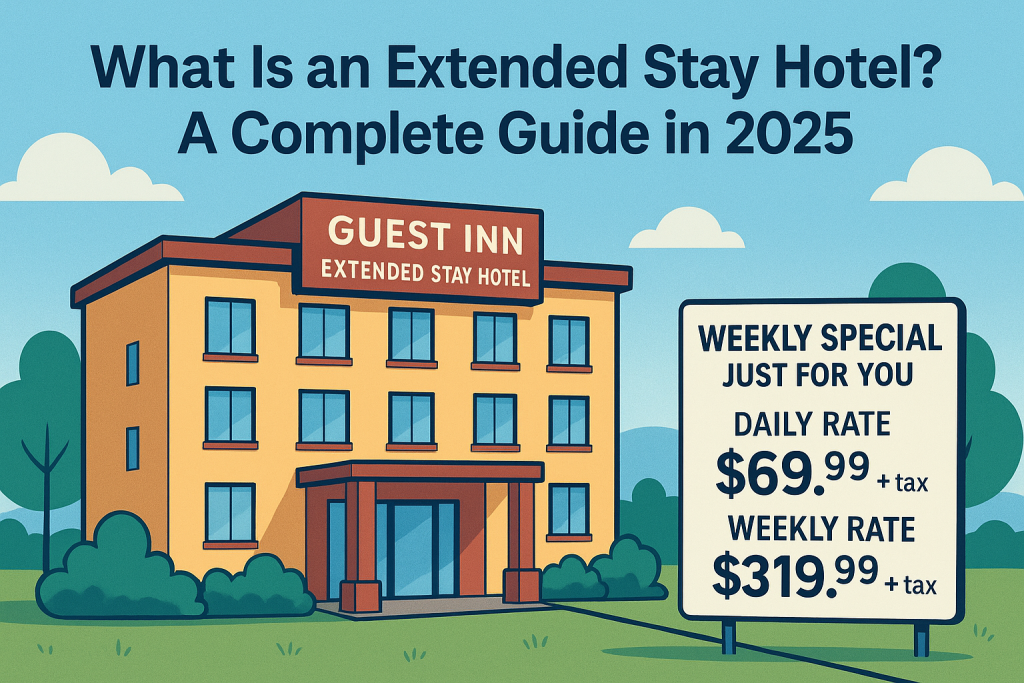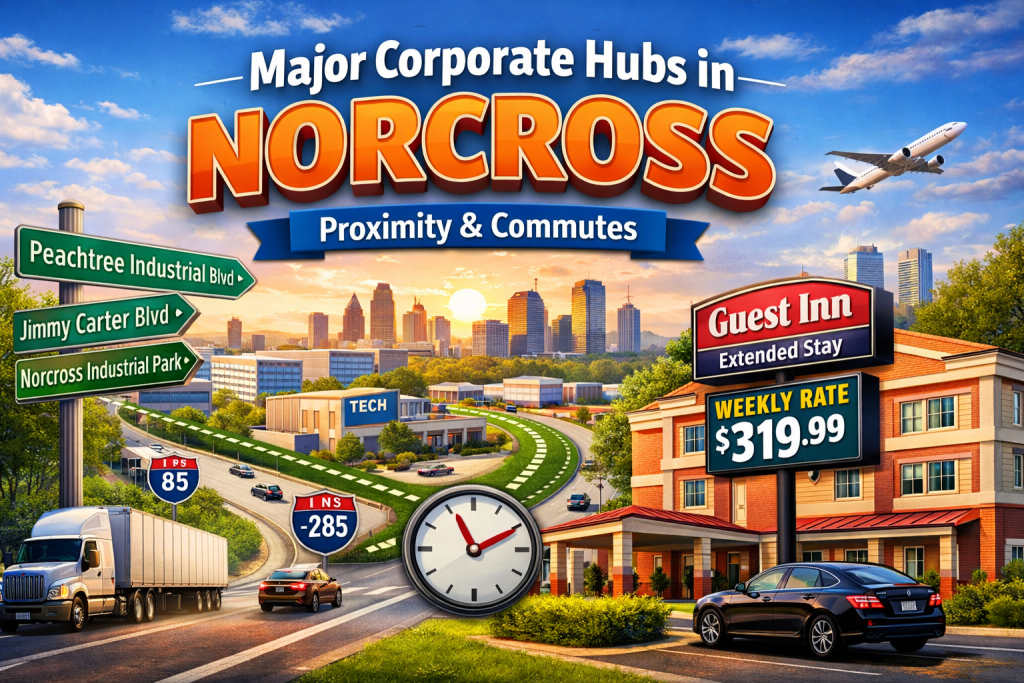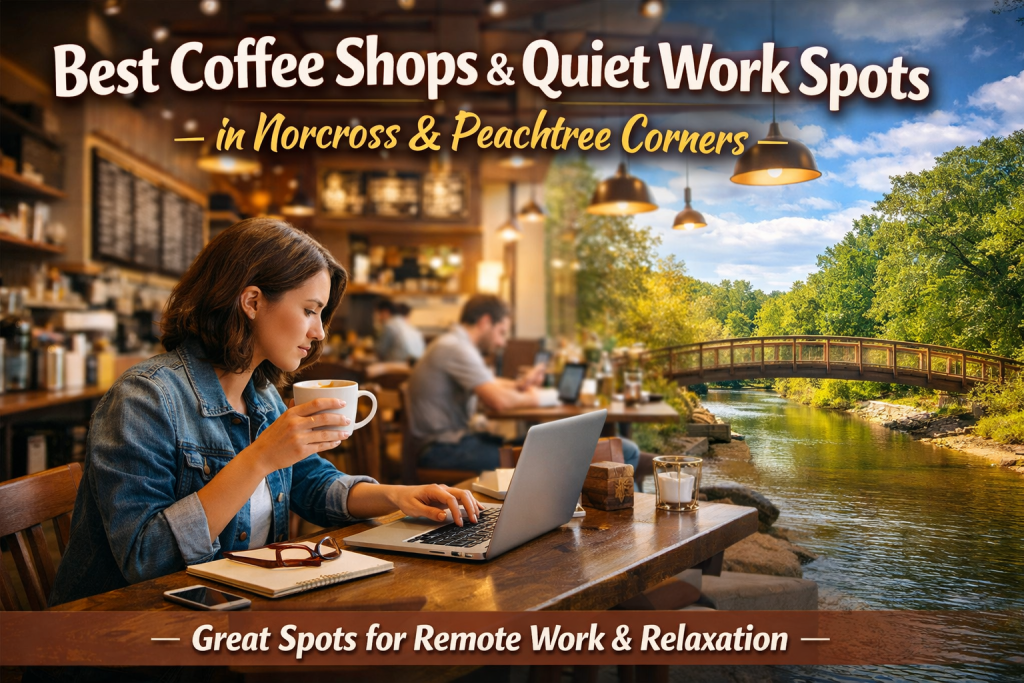
What Is an Extended Stay Hotel? Complete Guide 2025
Did you know that in the U.S., the extended-stay hotel market has been growing by leaps and bounds—boosted by business travelers, digital nomads, and folks in between homes? (Yes, that includes me, when I once relocated for work and had to live out of a suitcase for a month.) So, What Is an Extended Stay Hotel? If you’ve ever wondered whether there’s a better option than hopping from one night-stay to another, this is your sign.
In this article, we’ll dive deep into “What Is an Extended Stay Hotel?”, explore its benefits and downsides, compare it to apartments or short-term rentals, and—because you asked nicely—highlight Guest Inn Extended Stay Hotel (located at 5375 Peachtree Industrial Blvd, Norcross, GA) as a practical example with real rates. By the end, you’ll feel like a mini-expert (and maybe even comfortable enough to book your next “home away from home”).
What Is an Extended Stay Hotel? — Definition & Basic Idea
So, let’s start with the question front and center: What Is an Extended Stay Hotel?
At its core, an extended stay hotel is a lodging option designed for guests who intend to stay for more than just one or two nights. Instead of the “sleep-and-go” model, it offers more home-like amenities to accommodate longer residencies. Some features often include kitchen or kitchenette facilities, self-serve laundry, larger living spaces, and discounts for weekly or monthly stays.
You might also see them called “long-stay hotels,” “apartment hotels,” or “serviced apartments” depending on branding and region. The idea is a hybrid between hotel comfort and apartment practicality.
Key characteristics typically include:
-
Longer minimum stay: Many properties start offering discounts or special rates after 5–7 nights.
-
In-room cooking facilities: Kitchens or kitchenettes (fridge, microwave, stovetop) let you prep meals.
-
Laundry services: On-site or in-unit washers/dryers.
-
Utilities and services included: Internet, water, sometimes even cleaning (though less frequent).
-
Flexible lease/no formal lease: Unlike an apartment where you might sign for 6 or 12 months, extended stay hotels keep things more flexible.
In legal or industry definitions, an “extended stay hotel” is often defined as a commercial lodging establishment that provides sleeping, bathing, and food preparation facilities for guests for stays beyond typical transient periods (e.g., over 30 days in some definitions). Law Insider+1
One useful way to conceptualize it: it’s the difference between a quick date and a committed relationship. A normal hotel is fine for casual flings; an extended stay is for when you’re settling in for something more serious.
Why Use an Extended Stay Hotel? (Pros & Use Cases)
Why would someone choose an extended stay hotel instead of a hotel or an apartment? Because it often strikes a sweet spot. Here are the main advantages:
✅ Advantages
-
Cost Efficiency for Longer Stays
— The nightly rate usually drops when you book a week or more.
— You save on eating out by cooking some meals.
— Utilities (Wi-Fi, electricity, water) are often bundled, so no surprise bills. -
Home-Like Comfort
— Separate living and sleeping zones, more space, sometimes balconies.
— Kitchen or kitchenette: cook your own pasta, poach eggs, or just keep snacks.
— Laundry onsite: no hauling clothes to random laundromats. -
Flexibility Without Commitment
— You usually avoid long leases or deposits.
— You can extend or shorten your stay (depending on the property policy).
— Good for transitional periods: relocating, between homes, work assignments, or renovation phases. -
Consistent Service & Safety
— You retain the hotel safety, staff, and infrastructure (security, front desk).
— Cleaner than random rentals, and service staff handle maintenance. -
Convenience
— Often located near business hubs, transit, or suburban nodes.
— Access to hotel amenities (lobby, lounge, gym, sometimes breakfast).
I remember when I had to move cities for a short-term contract. I was between rentals, and an extended stay hotel saved me from dragging all my stuff into a two-week AirBnB, only to shuffle again. It gave me the option to cook, set up a mini-office, and not feel like I was camping in a suit.
⚠️ Disadvantages / Trade-offs
It’s not perfect. Be aware of:
-
Higher per-square-foot cost vs. a traditional apartment, especially for long stays of 4–6+ months.
-
Less frequent housekeeping (some properties only offer weekly cleaning).
-
Wear and tear is more visible—some rooms show more signs of use.
-
Limited amenities vs luxury hotels.
-
Policies and rules: some extended stay hotels have stricter rules on check-outs, guest policies, or maximum stay durations.
In one Reddit thread, someone commented:
“Extended stay properties are often not in very good condition given the type of guest staying… wear and tear is much more prevalent.” Reddit
It’s not meant to scare you—just a reminder to inspect and read reviews.
Extended Stay vs. Traditional Hotel vs. Apartment vs. Short-Term Rental
Let’s put things side by side.
| Type of Accommodation | Ideal Stay Length | Lease Requirement | Amenities / Utilities | Flexibility | Cost Efficiency |
|---|---|---|---|---|---|
| Traditional Hotel | 1–7 nights | None | Full service, daily housekeeping | High | Weak for long stay |
| Extended Stay Hotel | 5 days to several months | No formal long lease | Kitchenette, laundry, bundled utilities | Moderate to high | Strong for 1–12 weeks |
| Apartment / Condo Rental | Months to years | Lease term (6–12+ mo) | Full kitchen, all utilities not always included | Low | Better for long term |
| Short-Term Rentals (Airbnb, VRBO) | Days to months | Often flexible stay terms | Varies widely | High | Sometimes competitive, but added costs (utilities, fees) |
So, What Is an Extended Stay Hotel? It’s that hybrid niche: more capability than a hotel, more convenience than a rental lease.
Many businesses and individuals choose extended stay hotels when their stay is uncertain—say, 4–8 weeks. As duration goes beyond a few months, a standard apartment often wins out in cost per square foot.
What to Look for When Choosing an Extended Stay Hotel
Of course, not all extended stay hotels are created equal. Here’s your checklist (my own “I-won’t-stay-if-not-there” list):
-
Kitchen Quality
Ensure there is a proper fridge, cooktop or stove, microwave, and cooking tools (pots, utensils). -
Laundry Options
In-room washer/dryer or reliable coin laundry on-site. -
Cleaning & Housekeeping Policy
Is it weekly, biweekly, or optional? Does it cost extra? -
Utility and Internet Terms
Are all utilities (electricity, water, gas, internet) included? Is there a bandwidth cap? -
Flexibility
Can you extend or shorten stay easily without huge penalties? -
Security & Staff Presence
24/7 desk, security features, staff to handle maintenance. -
Location & Access
Closeness to grocery, transit, work sites. Safe neighborhood. -
Pet Policy, Parking, and Amenities
If you travel with pets or car, check those extra rules. -
Transparent Pricing
Weekly/monthly rates available, no hidden fees. -
Guest Reviews & Condition
Photos, recent reviews showing maintenance, smell, noise level.
Spotlight: Guest Inn Extended Stay Hotel
Let me bring this home (literally) by giving you a real-world example: Guest Inn Extended Stay Hotel, in Norcross, Georgia.
-
Address: 5375 Peachtree Industrial Blvd, Norcross, GA 30092, United States
-
Phone: (678) 736-6610
Why Consider Guest Inn Extended Stay?
Because it meets many of the criteria above, and offers competitive weekly/daily rates that make it appealing for medium-term stays.
Rates & Specials
-
Daily Rate: $69.99 + tax
-
Weekly Rate: $319.99 + tax
If you do the math:
-
At daily rate, 7 nights = ~$489.93 + tax
-
Weekly rate gives you 7 nights for ~$319.99 + tax
That’s a savings of about 35–40% over choosing nightly stays—classic extended stay economics kicking in.
You could stay there for a few nights or stretch weeks without committing to a lease. It’s perfect for someone relocating, on an assignment, or just wanting a stable base without a landlord’s paperwork.
What to Confirm When Booking
When you call or visit Guest Inn Extended Stay Hotel, here are questions to ask:
-
Are utilities and internet included or extra?
-
How often is housekeeping?
-
What kitchen appliances are available (full kitchen, kitchenette)?
-
Can you extend your stay at the same weekly rate?
-
Is parking free? Are pets allowed?
If they check all those boxes, you’re golden.
Practical Tips & Best Practices for Extended Stay Guests
Here’s my “been-there-done-that” advice so your long stay doesn’t feel like a marathon:
-
Pack smart: Bring reusable kitchen utensils, a good nonstick pan, favorite spices. Hotels usually provide basics, but your own stuff makes life easier.
-
Clean regularly: Wipe surfaces, take out trash; you’re living there longer.
-
Socialize (if you want): In many extended stay hotels, guests settle in. Say hi in the lobby or common room—don’t be a hermit!
-
Watch energy usage: Because utilities are often bundled, run AC/heating only when needed, turn off extra lights.
-
Stay organized: Use storage bins to keep your “temporary home” tidy.
-
Ask about extensions early: When your stay is up, request extensions before deadline to lock your rate.
-
Compare quarterly: If your stay passes a few months, check whether switching to a longer-term rental is better.
-
Check-in with neighbors: If there are nearby grocery stores, laundromats, transit, score cards for your favored ones.
Trends & Changes in 2025
Since you asked for a 2025–ready guide, here are some newer trends shaping extended stay hotels this year:
-
Branded extended-stay growth: Big hotel brands like Marriott, Hilton, and Hyatt continue pushing into extended-stay concepts.
-
Midscale extended stay: More affordable, no-frills extended stay brands are popping up to serve budget-conscious travelers.
-
Resilience during downturns: Extended-stay properties tend to perform better during economic shifts because their business is less dependent on nightly travelers.
-
Hybrid models: Some hotels are blending coworking, shared kitchens, communal spaces to appeal to remote workers and digital nomads.
-
Longer minimums: Some places now enforce minimum stay durations like 3–5 nights or even a week before special rates.
So when you ask What Is an Extended Stay Hotel? in 2025, it’s evolving. It’s not static; the concept keeps adapting to traveler needs.
Frequently Asked Questions (FAQs)
-
What Is an Extended Stay Hotel’s Minimum Stay?
That depends on the property. Many require a 5–7 night minimum to activate weekly rates, though some may permit shorter stays at standard nightly rates. -
Is housekeeping daily?
Usually not. Many extended stay hotels offer weekly or biweekly cleaning rather than daily service. -
Do I still have to sign a lease?
No. That’s one of the perks. You get flexibility without a long-term lease commitment. -
How does billing work?
Most places bill weekly or monthly. Utilities are generally wrapped in, but ask for clarity on internet, electricity caps, or other extras. -
Can I check out early without penalty?
It depends on the cancellation policy. Some extended stay hotels allow pro-rated refunds; others may require paying the rest of the week. Always read the fine print.
Final Thoughts
So, What Is an Extended Stay Hotel? It’s a hybrid lodging option that blends the comfort and flexibility of home with the service and structure of a hotel. If you’re staying more than a few nights—and especially if you’re staying for weeks to months—it can be a smarter, more comfortable, and often more economical choice.
If Guest Inn Extended Stay Hotel checks your boxes (kitchen, laundry, utility-included, flexible extension), then it’s a solid candidate. And if not, use the tips above to find a spot that does.
If you like, I can also do a local area comparison (other extended stay hotels around Norcross, GA) or even a sample itinerary for a week-long stay. Want me to map those out for you?

